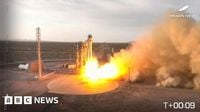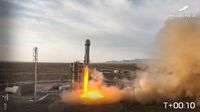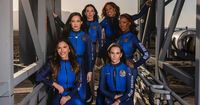In a historic moment for space exploration, Blue Origin successfully launched an all-female crew to the edge of space on April 14, 2025. This mission, known as NS-31, marked the first time since 1963 that an all-female crew has ventured into space, a milestone that has sparked discussions about gender representation in the aerospace industry.
The flight took off from Blue Origin’s Launch Site One in West Texas at 8:30 a.m. local time, soaring approximately 62 miles (100 kilometers) above Earth, crossing the Kármán line, the internationally recognized boundary of space. The crew, which included prominent figures such as broadcast journalist Gayle King, pop star Katy Perry, former NASA rocket scientist Aisha Bowe, bioastronautics research scientist Amanda Nguyen, film producer Kerianne Flynn, and Lauren Sánchez, Jeff Bezos' fiancée, experienced about three minutes of weightlessness during their brief journey, which lasted 10 minutes and 21 seconds.
Upon returning to Earth, Ms. King expressed her emotions, stating, "I would just like to have a moment with the ground," before kneeling in gratitude. Reflecting on her experience, she added, "I stepped out of my comfort zone in a way that I never thought was possible for me. And now that I’ve done it, I really do feel I can take on anything, anything." Meanwhile, Katy Perry entertained the crew with her rendition of "What a Wonderful World," emphasizing that the flight was about a collective energy rather than just showcasing her music.
This flight is noteworthy not only for its all-female crew but also for its significance in the realm of space tourism, a sector that has been criticized for being an exclusive playground for the wealthy. Critics like actress Olivia Munn have labeled the journey "a bit gluttonous," questioning the priorities of those who can afford such experiences amidst pressing global issues. Munn remarked, "What are you guys going to do up in space?"
Despite the criticisms, supporters of the mission celebrate it as a step forward for women in STEM (science, technology, engineering, and mathematics) fields. Amanda Nguyen, who made history as the first Vietnamese woman to go to space, shared her journey of overcoming personal adversity. She stated, "It’s a dream come true, and for me it was a dream deferred," explaining her transition from NASA to activism after experiencing sexual assault. Nguyen highlighted the barriers that gender-based violence poses for women pursuing careers in STEM, stating, "Gender-based violence is a big reason why so many women in STEM don’t continue on with their training, and I was one of those women."
Blue Origin's New Shepard program, which has now completed 11 human flights, has previously carried 52 individuals, including repeat astronauts. The rocket is named in honor of Alan Shepard, the first American to reach space in 1961. Jeff Bezos, the founder of Blue Origin, was himself a passenger on the company's first suborbital flight in 2021 and has invested heavily in the vision of future human colonies in space.
However, the connection between this mission and Bezos' business practices has not gone unnoticed. During an interview on CBS Mornings, Gayle King addressed concerns about the flight serving as a promotional vehicle for Bezos, who has faced scrutiny over Amazon's labor practices and recent controversies surrounding The Washington Post, which he owns. When asked about these concerns, King acknowledged, "There have been some questions and decisions that he’s made that I’ve actually gone, ‘huh?’" Yet, she emphasized that the mission's significance transcends any single individual or company, stating, "This is so much bigger than one man and one company. I’ve chosen to separate the two."
As the dust settles on this groundbreaking mission, many are left to ponder its implications for the future of space exploration and gender representation within it. The excitement surrounding the flight is palpable, but so too are the questions about the ethics and accessibility of such experiences. As more private companies enter the space tourism industry, the hope is that they will also address the disparities that exist in who gets to experience the wonders of space travel.
With this mission, Blue Origin has not only made history but has also ignited a conversation about the role of women in space exploration, the responsibilities of billionaires in the industry, and the broader implications of space tourism in a world facing numerous challenges. As the first all-female crew to reach space since Valentina Tereshkova in 1963, this flight serves as a powerful reminder of the strides being made toward inclusivity in fields traditionally dominated by men.
Looking ahead, the success of this mission could pave the way for more diverse crews in future flights, inspiring a new generation of young women to pursue careers in science and engineering. As the crew members return to their lives on Earth, their experiences may resonate far beyond the launch site, encouraging discussions about empowerment, representation, and the future of humanity in space.



